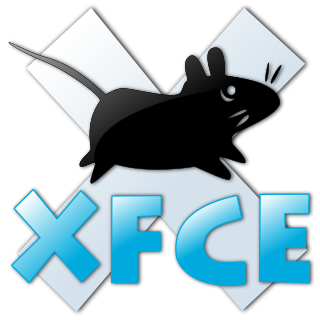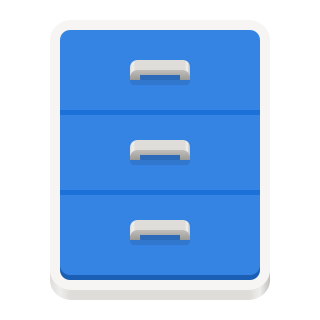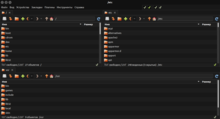A file manager or file browser is a computer program that provides a user interface to manage files and folders. The most common operations performed on files or groups of files include creating, opening, renaming, copying, moving, deleting and searching for files, as well as modifying file attributes, properties and file permissions. Folders and files may be displayed in a hierarchical tree based on their directory structure.

Xfce or XFCE is a free and open-source desktop environment for Linux and other Unix-like operating systems.

GNOME Files, formerly and internally known as Nautilus, is the official file manager for the GNOME desktop. Nautilus was originally developed by Eazel with many luminaries from the tech world including Andy Hertzfeld (Apple), chief architect for Nautilus. The nautilus name was a play on words, evoking the shell of a nautilus to represent an operating system shell. Nautilus replaced Midnight Commander in GNOME 1.4 (2001) and has been the default file manager from version 2.0 onwards.

IceWM is a stacking window manager for the X Window System, originally written by Marko Maček. It was written from scratch in C++ and is released under the terms of the GNU Lesser General Public License. It is customizable, relatively lightweight in terms of memory and CPU usage, and comes with themes that allow it to imitate the GUI of Windows 95, Windows XP, Windows 7, OS/2, Motif, and other graphical user interfaces.

Fluxbox is a stacking window manager for the X Window System, which started as a fork of Blackbox 0.61.1 in 2001, with the same aim to be lightweight. Its user interface has only a taskbar, a pop-up menu accessible by right-clicking on the desktop, and minimal support for graphical icons. All basic configurations are controlled by text files, including the construction of menus and the mapping of key-bindings. Fluxbox has high compliance to the Extended Window Manager Hints specification.

Rhythmbox is a free and open-source audio player software, tag editor and music organizer for digital audio files on Linux and Unix-like systems.
fstab is a system file commonly found in the directory /etc on Unix and Unix-like computer systems. In Linux, it is part of the util-linux package. The fstab file typically lists all available disk partitions and other types of file systems and data sources that may not necessarily be disk-based, and indicates how they are to be initialized or otherwise integrated into the larger file system structure.
Linux Terminal Server Project (LTSP) is a free and open source terminal server for Linux that allows many people to simultaneously use the same computer. Applications run on the server with a terminal known as a thin client handling input and output. Generally, terminals are low-powered, lack a hard disk and are quieter and more reliable than desktop computers because they do not have any moving parts.
udev is a device manager for the Linux kernel. As the successor of devfsd and hotplug, udev primarily manages device nodes in the /dev directory. At the same time, udev also handles all user space events raised when hardware devices are added into the system or removed from it, including firmware loading as required by certain devices.
The following tables compare general and technical information for a number of notable file managers.

In computing, a tiling window manager is a window manager with an organization of the screen into mutually non-overlapping frames, as opposed to the more common approach of coordinate-based stacking of overlapping objects (windows) that tries to fully emulate the desktop metaphor.
The Windows shell is the graphical user interface for the Microsoft Windows operating system. Its readily identifiable elements consist of the desktop, the taskbar, the Start menu, the task switcher and the AutoPlay feature. On some versions of Windows, it also includes Flip 3D and the charms. In Windows 10, the Windows Shell Experience Host interface drives visuals like the Start Menu, Action Center, Taskbar, and Task View/Timeline. However, the Windows shell also implements a shell namespace that enables computer programs running on Windows to access the computer's resources via the hierarchy of shell objects. "Desktop" is the top object of the hierarchy; below it there are a number of files and folders stored on the disk, as well as a number of special folders whose contents are either virtual or dynamically created. Recycle Bin, Libraries, Control Panel, This PC and Network are examples of such shell objects.

GNOME Commander is a 'two panel' graphical file manager for GNOME. It is built using the GTK+ toolkit and GVfs.

LXDE is a free desktop environment with comparatively low resource requirements. This makes it especially suitable for use on older or resource-constrained personal computers such as netbooks or system on a chip computers.

Dolphin is a free and open source file manager included in the KDE Applications bundle. Dolphin became the default file manager of the KDE Plasma desktop environments in the fourth iteration, termed KDE Software Compilation 4. It can also be optionally installed on K Desktop Environment 3. It replaces Konqueror as the default file manager for KDE SC 4, but Konqueror can still be used as an alternative file manager.

In computing, the trash, also known by other names such as dustbin, wastebasket, and others, is a graphical user interface desktop metaphor for temporary storage for files set aside by the user for deletion, but not yet permanently erased. The concept and name is part of Mac operating systems, a similar implementation is called the Recycle Bin in Microsoft Windows, and other operating systems use other names.

PCMan File Manager (PCManFM) is a file manager application, developed by Hong Jen Yee from Taiwan, which is meant to be a replacement for GNOME Files, Dolphin and Thunar. PCManFM is the standard file manager in LXDE, also developed by the same author in conjunction with other developers. Since 2010, PCManFM has undergone a complete rewrite from scratch; build instructions, setup and configuration have changed in the process.
GVfs is GNOME's userspace virtual filesystem designed to work with the I/O abstraction of GIO, a library available in GLib since version 2.15.1. It installs several modules that are automatically used by applications using the APIs of libgio. There is also FUSE support that allows applications not using GIO to access the GVfs filesystems.










